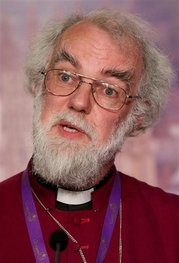This is a reply to an article by John W Martens. For it to make sense, you should read his article first.
John,
Thank you for the response to my comments.
I attempted to post this reply to your article on your blog, but it seems that Blogger has a maximum of 4096 characters in the response box, so I have had to write my reply here. I didn’t want to do that since I thought it would create too much jumping around in the unlikely event that someone might want to read through the whole exchange.
I’ll start by returning to my suspicion that when Rowan Williams uses the word “miracle” he means something different to what I mean when I use it.
I am willing to go along with the plausibility of the idea that the transition from proto-humans to humans occurred when they became aware of a call from God. What eludes me is how this “call” could be anything other than supernatural. If it was supernatural, it was outside nature and was an intervention in the normal processes of nature: it “tinkered” with nature. If it was not outside nature, yet still came from God, it means God himself is subject to his creation and its laws: he is a victim of its causal phenomena.
I’m not sure your saying:
“Williams is asking for us to see God as immanent and always present and always active in the processes of nature and being and not intervening from “the outside,” a trap into which I think David Jenkins falls.”
helps much in resolving that problem since God’s immanence and resulting activity in the processes of nature either has to be contained by nature and thus subject to it or not. If not, then it is still intervening from “the outside.” From the confines of my “outside” trap, I would suggest that if you “den[y] the separation of God from nature” you teeter perilously close to a different trap: pantheism.
When Terry Nichols says “nature is not a closed system but an open system within a larger, divine context”, I think he is assisting my case, not yours. A system being “open”, implies that there is something outside the system which could influence it. When a door to my house opens, a breeze is likely to enter; if there is nothing outside my door – a vacuum – the reverse would happen. Either way, there has been intervention in my system. That is, unless Nichols wishes to render the same service for the word “open” as Williams seems to want to do for “miracle”: reduce it to unintelligibility.
Your use of the word “arbitrary” in relation to God’s action in the world puzzles me. Why would one assume that when God intervenes, it must be “arbitrary”? To say that implies action without thought – capricious as Rowan Williams puts it – a sort of divine flailing about. I presume you would admit that a human mind acts with a degree of free will in the universe? My intention in typing this sentence originates in an immaterial part of me – my mind or soul – and has physical results in the material world. If that is not arbitrary and capricious (I’m presuming on your generosity in granting me that it isn’t), why must God’s acting in the world be arbitrary and capricious? God is a person and, as such, must be able to act in the world to a much more sophisticated degree than the people who bear his image.
I would agree that “miracle” as defined by David Hume, a violation of the laws of nature, is something that Rowan Williams has an aversion to, but I would argue a few things: first that God’s acting in the universe does not necessarily violate the laws of nature any more than the acts of any immaterial free agents – human minds – do. The Hume objection only makes sense for an isolated or closed system: if the universe is not causally closed, the Hume definition doesn’t hold. Second, this type of objection is only relevant to a Newtonian view of the universe. Quantum Mechanics describes the universe as a system constrained by probabilities rather than laws. Bradley Monton (philosopher of religion and science) pointed out:
“I think that all miracles are pretty unproblematically compatible with the GWR [Ghiradi-Rimini-Weber] theory….. So for changing water into wine, it’s not a big deal – you’ve got a bunch of individual particles (electrons, protons etc.) that are composing the water, and they can all have GWR hits such that their positions are redistributed to the locations that would be appropriate for them to compose wine”.
That still would take God’s intervention, of course.
In conclusion then, I’ll repeat the definition of miracle that I made in one of my earlier comments: “an event in the external world brought about by the immediate agency or the simple volition of God.” I still think my saying that Rowan Williams’ remarks imply that he does not believe in miracles is justified on the grounds that he has redefined “miracle”: that is cheating. I would say the same for Christian thinkers who reason along the same lines.


